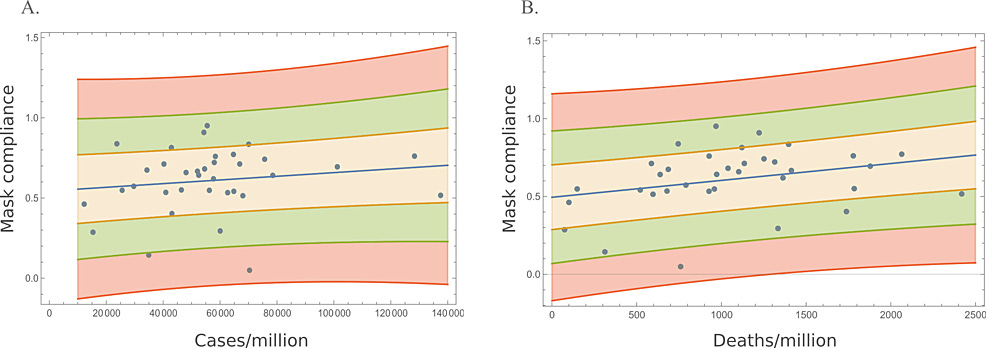Your support is very much appreciated. Please consider taking out a paid subscription to support independent journalism.
And there are a just a few hours left to get a 20% discount off your subscription!

A newly published, peer-reviewed study in Cureus looked to see if there was a correlation between mask compliance and COVID-19 outcomes in Europe. The study was undertaken at the University of Sao Paulo in Brazil.
The authors noted that previous trials about mask effectiveness had produced mixed results and those that concluded that masks were associated with a reduction in transmission and cases were conducted out of season.
“The World Health Organization (WHO) as well as other public institutions…strongly recommend the use of masks as a tool to curb COVID-19 transmission. These mandates and recommendations took place despite the fact that most randomised controlled trials carried out before and during the COVID-19 pandemic concluded that the role of masks in preventing respiratory viral transmission was small, null, or inconclusive. Conversely, ecological studies, performed during the first months of the pandemic, comparing countries, states, and provinces before and after the implementation of mask mandates almost unanimously concluded that masks reduced COVID-19 propagation.
However, mask mandates were normally implemented after the peak of COVID-19 cases in the first wave, which might have given the impression that the drop in the number of cases was caused by the increment in mask usage. For instance, the peak of cases in Germany's first wave occurred in the first week of April 2020, while masks became mandatory in all of Germany's federal states between the 20th and 29th of April, at a time when the propagation of COVID-19 was already declining.
Furthermore, the mask mandate was still in place in the subsequent autumn-winter wave of 2020-2021, but it did not help preventing the outburst of cases and deaths in Germany that was several-fold more severe than in the first wave.”
Due to the different levels of masking in Europe (5% - 95% compliance), it gave the authors the opportunity to test masking during a strong COVID-19 wave.
“Data were collected from the following Eastern and Western European countries: Albania, Bosnia and Herzegovina, Bulgaria, Croatia, Czechia, Hungary, North Macedonia, Poland, Romania, Serbia, Slovakia, Slovenia, Belarus, Estonia, Latvia, Lithuania, Republic of Moldova, Ukraine, Austria, Belgium, Denmark, Finland, France, Germany, Greece, Ireland, Italy, Netherlands, Norway, Portugal, Spain, Sweden, Switzerland, United Kingdom, and Northern Ireland. The inclusion criterion was a population size higher than one million people.”
Analysis was undertaken to verify if masking correlated with COVID-19 morbidity and mortality. The data looked at were between October 2020 and March 2021, in the 35 European countries listed above, during which all the countries went through a peak COVID-19 infection wave.
The average proportion of masking was 60.9% with Eastern Europe being slightly higher than Western Europe. However, compliance was much more homogeneous in the East than the West.
Importantly, results showed a weak positive correlation for mask compliance versus morbidity (cases) and mortality (deaths).
Each dot in the diagrams above represent a different country. As you can see, as mask compliance goes up, so do cases/million and deaths/million.
Please note, the positive correlation for mask usage and cases was not statistically significant. However, the correlation for masks and deaths WAS statistically significant.
The correlation was even higher in the West compared to Eastern countries. It is suggested that this could be because larger countries are located in the West. However, even when the largest countries were removed, the correlations hardly changed.
Various other analyses were performed, e.g. using smaller and larger countries but no tests resulted in negative correlations.
The authors conclude by saying that “while no cause-effect conclusions could be inferred from this observational analysis, the lack of negative correlations between mask usage and COVID-19 cases and deaths suggest that the widespread use of masks at a time when an effective intervention was most needed, i.e., during the strong 2020-2021 autumn-winter peak, was not able to reduce COVID-19 transmission. Moreover, the moderate positive correlation between mask usage and deaths in Western Europe also suggests that the universal use of masks may have had harmful unintended consequences.”
Science is finally catching up with the science that disappeared two years ago. Whilst this study is not conclusive, it is quite damning and will be interesting to see what masking mandates or recommendations are brought back, next winter, after this.




Every single thing the “experts” recommend or mandated has made things worse.
They'll probably try to argue that countries that got hit worse by COVID were more likely to see widespread mask compliance.
The other and obvious interpretation, that smothering people during a respiratory virus outbreak weakened their immune systems and left them more likely to be infected, whilst also weakening their bodies in general and therefore leaving them less capable of fighting and surviving the infections the masks did nothing to prevent, won't be considered.